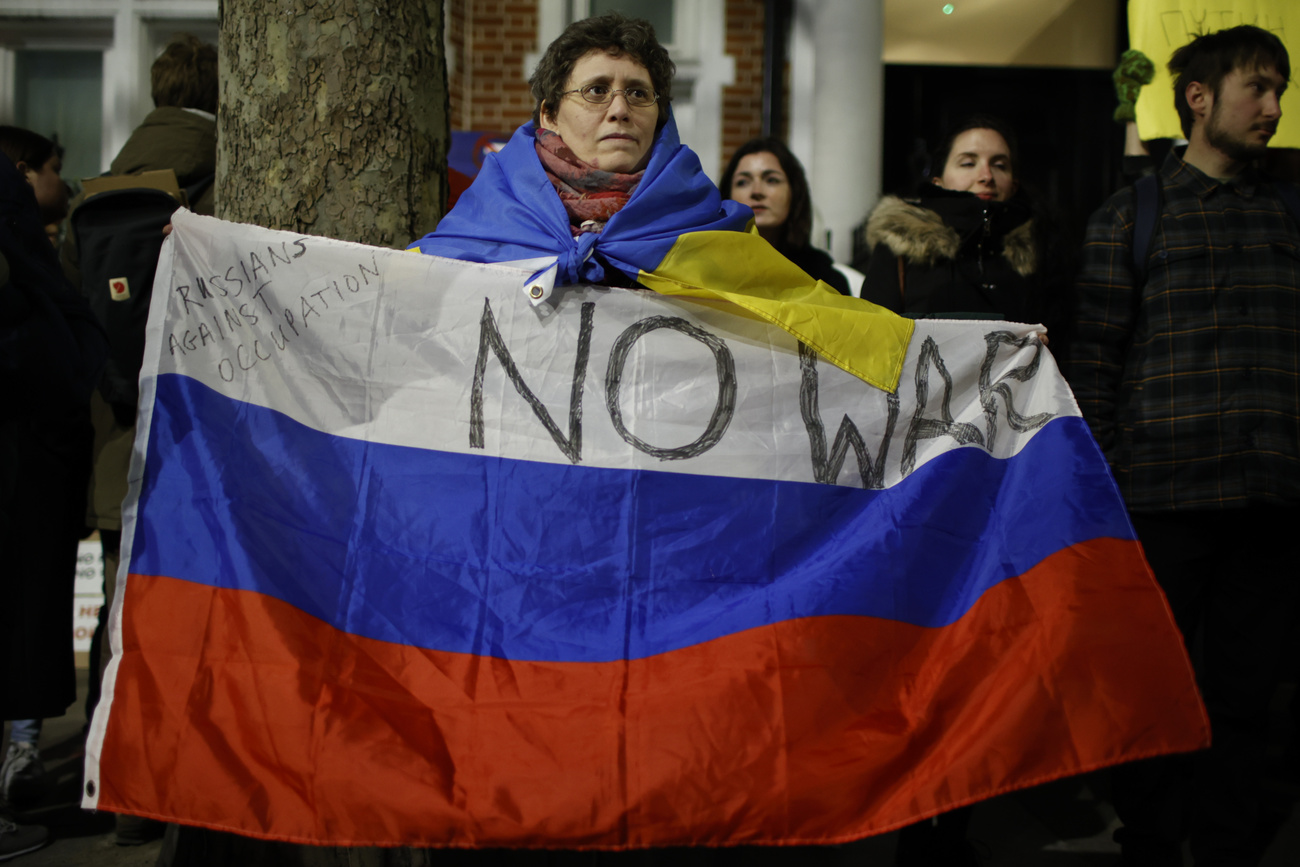
Swiss trading hub adapts to new wartime reality

After Switzerland took a historical step to impose economic sanctions against Russia to align them with Europe and the United States on Monday, its commodities trading ecosystem - a key cogwheel for Russian exports - is having to adapt.
Far outweighing its geographic size, Switzerland is where three-quarters of Russian crude oil and oil products are managed and where Nord Stream 2, the controversial Russian gas pipeline project, has been headquartered – until recently. In a development on Tuesday, it was reported that Zug-based Nord Stream 2 had made over 140 of its employees redundant as a result of the sanctions.
Switzerland is also a major hub for Russian and Ukrainian grain and vegetable oil trading. Specialised banking services here provide credit to traders, and shipping companies fill another important piece of the trading system.
After Swiss President Ignazio Cassis announced that the country would immediately freeze Russian assets in reaction to the Russian invasion of Ukraine, many traders told SWI swissinfo.ch that they were assessing the situation and would comply with international sanctions.
Nonetheless, the current situation means that their operations are being hit, including access to commodity sources and credit, as well as to insurance and shipping.
“The problem is how can we continue to trade with them since we cannot make wire transfers with Russian banks that are no longer in the SWIFT system?” said Florence Schurch, secretary general of the Swiss Trading and Shipping Association, the sector’s lobby group.
Apart from Canada, which announced on Tuesday a ban on Russian oil, international sanctions have not specifically targeted commodities in a bid to limit the price impact for consumers. But recent measures taken to cut some Russian banks from SWIFT – the key global financial messaging system – and prevent the country’s central bank from deploying its reserves, are complicating transactions with Russian commodities suppliers.
Société Générale and Credit Suisse, two key banks providing credit to commodities traders, announced on Monday that they would stop financing Russian trades. Traders depend on short-term credit lines to finance transactions before being paid back on delivery of the goods. Not being able to access such credit complicates trades, including shipment of commodities which can range from energy products to food supplies and metals.
The big financial groups ING and Rabobank are also limiting access to credit for Russian commodities deals. The Russian banks Gazprombank and Sberbank, which have branches in Switzerland and were on the US sanctions list, also offered trade finance services ahead of the conflict.
Amid the growing credit squeeze, increasing isolation of Russia and a tumbling rouble, which as of Tuesday had lost 30% of its value against the dollar, many commodities firms preferred not to comment.
Wartime responses
Trafigura is one of a number of Geneva-based firms trading in Urals crude oil, a staple for European refiners, which also include Glencore, Vitol and Gunvor. “We continue to closely monitor the situation and ensure any transactions we undertake comply with applicable regulatory requirements and sanctions,” said Trafigura in an emailed statement.
On Wednesday, Trafigura announced it had frozen its investments in Russia in the wake of Moscow’s invasion of Ukraine and was reviewing its 10% stake in Rosneft’s Vostok Oil project in the Arctic. Earlier this week, British oil major BP announced it was exiting its 19.75% voting stake in Rosneft, and Shell let go of its Russian stakes,External link ahead of Russia’s ban to sell national assets.
Meanwhile, Glencore said mid-February that it had sold a minority share in Russneft, a smaller oil producer, after its founder was put on an EU sanction list last year. It also holds a 10.55% stake in En+, a hydropower and metals group and another stake in Rosneft. In a statement on Tuesday evening, the company said: “We have no operational footprint in Russia and our trading exposure is no material for Glencore.”
Gunvor’s co-founder Gennady Timchenko, Russia’s sixth-wealthiest oligarch, sold his shares in the firm in 2014 after being placed on an earlier US sanctions listExternal link following Russia’s annexation of Crimea, linking his business activities to Putin.
While some energy traders downplayed the impact of sanctions, with reportsExternal link on Tuesday signalling ongoing oil trading activity in Russia, the price of Brent crude, the international benchmark, has surged to above $112 a barrel, a level not seen since 2014.

More
Switzerland backs full EU sanctions against Russia
What new normal?
For Giacomo Luciani, a commodities expert, traders are currently responding to the intentions of most Western governments, reluctant to prompt higher prices following any reductions in energy supplies. They are keeping the flow of products from Russia for now, albeit at higher transactional costs.
But he expects the situation to change in the longer term.
“Down the road, we will see deliberate actions and policies to progressively reduce (the West’s) dependence on Russian oil and gas, probably affecting oil before gas, by way of discouraging the export of oil products from Russia,” Luciani said.
This means traders will source crude oil imports from other parts of the world, including from OPEC, a cartel of major oil exporting countries. OPEC+ oil countries, made up of OPEC members led by Saudi Arabia and non-cartel members, on Wednesday agreed to stick to their modest output rises.
Luciani added however that like the period after the US imposed sanctions on Venezuela in 2019, some traders may see opportunities to trade with Russia.
“China and India are shrewd traders and would not want to pay the same price” for oil once it becomes increasingly difficult for Western traders to do business with the country, he said, which would force Russia to export oil at a sharp price cut. “The Chinese would certainly look forward to a significant discount and so would the Indians,” said Luciani. China and India have not imposed sanctions on Russia.
The strain on grains
In addition to the disruptions of supplies in energy products, Swiss-based traders of agricultural products are also seeing the impact of sanctions on trade finance, as well as a halt in production in Ukraine, where workers have stopped their jobs to head to the frontlines or flee the conflict.
“(These issues) will impact everybody because Russia and Ukraine are contributing a lot to providing cereals and grains to the rest of the world,” Schurch said. As the first and fifth largest wheat producers, respectively, Russia and Ukraine together account for a quarter of global production. “It will be a big issue for the rise in soft commodity prices.”
Wheat and corn prices are already soaring, and there is growing concern that disruptions in supplies will affect food security, particularly in the Middle East and Africa, top buyers of Russian grain.
“As long as the war continues, there will be bottlenecks” for supplies of food commodities, said Ivo Sarjanovic, a lecturer at the University of Geneva’s commodity trading programme. “Buyers will have to pay more, switch to alternative sources or eventually run out of stocks.”
Traders have already been buying wheat and corn from Romania and smaller shipments of French corn for sale in Europe. Wheat from Argentina and Uruguay are expected to provide alternatives for markets further afield.
Shipping woes
Difficulties in shipping food and other commodities are a further test for another area of Switzerland’s commodities ecosystem, which houses the world’s largest shipping company, MSC. According to a reportExternal link by the United Nations Conference on Trade and Development, land-locked Switzerland ranked 13th among the top ship-owning economies, ahead of the Netherlands, Italy and Russia.
Shipping costs have spiked as disruptions intensified on trade routes through the Black Sea. Ships, including a vessel chartered by the global trading firm Cargill, have been hit by shelling, while insurers are charging premiums or refusing to cover ships sailing to the region. MSC did not respond to requests to comment.
Schurch said that with a number of ships stuck around the embattled Ukrainian ports of Odessa and Mariupol, a new crisis in shipping is emerging.
“There are big issues regarding shipping especially after having recovered from the pandemic, when there was a shortage in supply,” the STSA chief said. “Now we are having trouble again with the supply chain.”

More
Russia sanctions: Nord Stream 2 fires more than 140 people in Zug

In compliance with the JTI standards
More: SWI swissinfo.ch certified by the Journalism Trust Initiative






























Join the conversation!